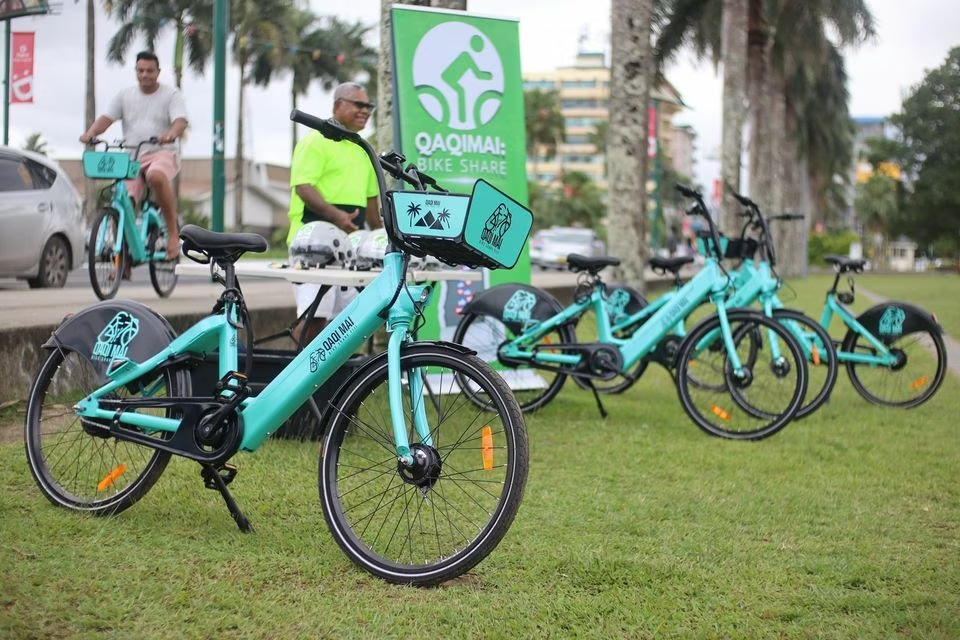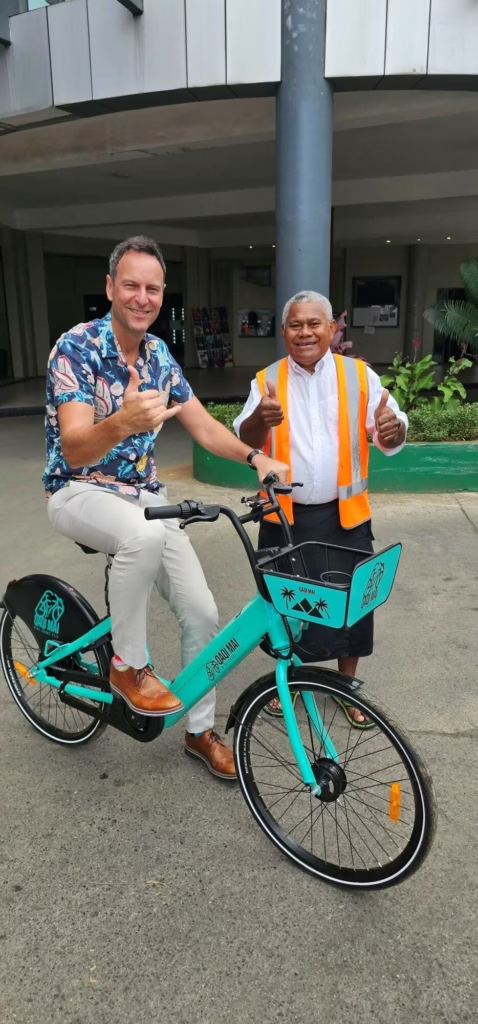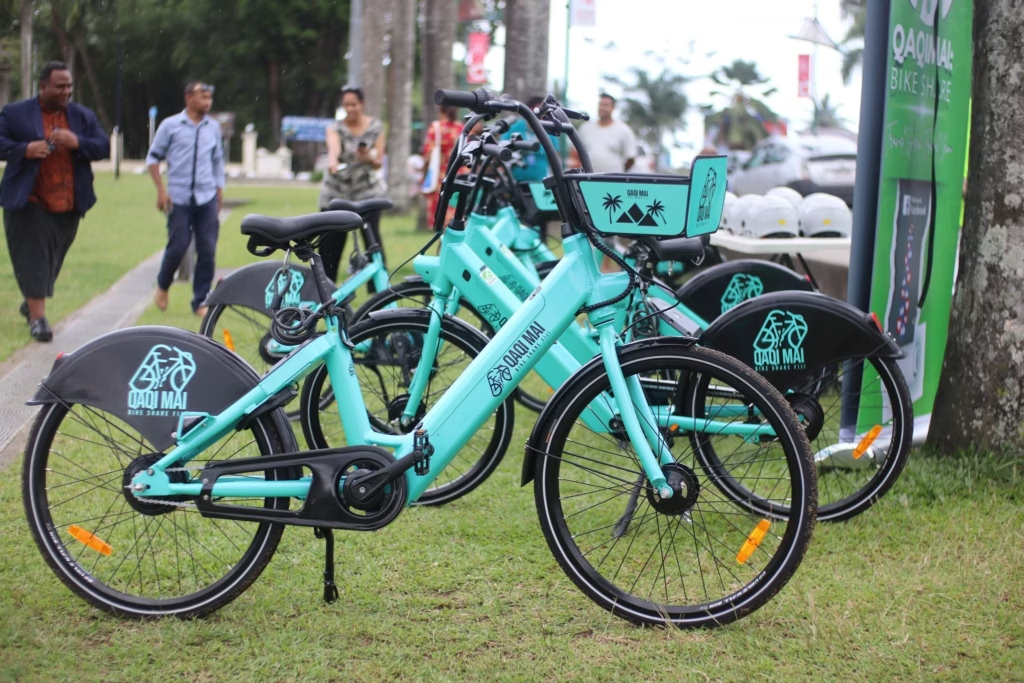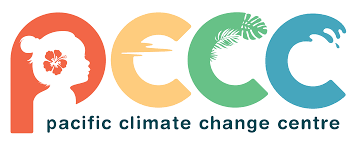Transforming Fiji’s transportation sector one bike at a time.

What is the innovation?
Qaqi Mai is Fiji’s first bike-sharing service, designed to transform transportation in the country while addressing pressing environmental, social, and economic challenges. At its core, Qaqi Mai is not just about bikes—it’s about creating a movement for sustainable and accessible mobility that serves local communities and tourists alike.
Our innovation lies in combining a proven global transportation model with Fiji’s unique context to create a tailored, hybrid solution. By introducing electric bikes (e-bikes) as a public transport alternative, we’re offering a cleaner, healthier, and more affordable mode of travel that aligns with Fiji’s environmental and cultural values. Unlike traditional bike-sharing models, Qaqi Mai is designed for Fiji’s specific needs: navigating limited infrastructure, accommodating diverse user demographics, and building partnerships to raise awareness about sustainable transport.
Key features of Qaqi Mai include:
1. Sustainability: E-bikes are eco-friendly and help reduce traffic congestion, noise pollution, and carbon emissions.
2. Accessibility: Our pay-per-use and subscription models ensure affordability for locals while catering to tourists seeking eco-conscious travel options.
3. Community-Centered Design: We engage local communities in decision-making and work to create employment opportunities in bike maintenance, customer service, and operations.
4. Tourism Integration: Our bikes enhance tourism experiences by providing visitors with an authentic, immersive way to explore Fiji while supporting green travel practices.
Despite the challenges of limited infrastructure and skepticism, Qaqi Mai thrives by leveraging lessons from global bike-sharing initiatives, adapting them to Fiji’s context, and actively influencing local authorities to support bike-friendly infrastructure.
Qaqi Mai’s innovative approach bridges the gap between sustainable development and everyday accessibility, making it more than a transportation service—it’s a catalyst for change.

How does this innovation resolve Pacific-related challenges?
The Pacific Island region faces unique transportation and environmental challenges that Qaqi Mai is strategically positioned to address through innovation.
Overcoming Limited Infrastructure: Pacific Island nations often lack extensive public transportation systems and bike-friendly infrastructure. Qaqi Mai capitalizes on these gaps by offering electric bike-sharing solutions that require minimal infrastructure investments. Bikes can adapt to narrow, uneven roads and congested urban areas, making them ideal for small island cities like Suva.
Reducing Carbon Footprint in Vulnerable Regions: Pacific Islands are on the frontline of climate change, facing rising sea levels and increasing environmental pressures. Qaqi Mai directly contributes to mitigating these impacts by reducing reliance on fossil-fuel-powered vehicles. Electric bikes produce zero emissions during use, aligning perfectly with regional efforts to champion sustainability and transition to renewable energy.
Cultural and Community Integration: Fijian and Pacific Island cultures are rooted in communal values, which Qaqi Mai embodies through its focus on shared mobility. By fostering collective ownership and engaging communities in bike-sharing operations, Qaqi Mai aligns its mission with local traditions of collaboration and mutual benefit.
Adaptation of Proven Models for Local Contexts: While bike-sharing is well established globally, Qaqi Mai has innovated by adapting successful international models to the unique Pacific context. By creating a hybrid system designed to navigate cultural and logistical challenges—such as low bike theft tolerance and variable road quality—Qaqi Mai ensures its approach is practical, scalable, and sustainable.
Affordable and Accessible Mobility: Many Pacific Island residents rely on expensive and time-consuming transportation options. Qaqi Mai offers an affordable, accessible alternative for short commutes, errands, and even tourism. This democratization of mobility supports economic inclusion for underserved populations, especially in urban and peri-urban areas.
Tourism Integration Potential: Tourism is a cornerstone of Pacific economies. Qaqi Mai aligns with the region’s shift toward eco-tourism by offering visitors a sustainable and immersive way to explore local culture and landscapes. Electric bikes, with their low environmental impact, appeal to environmentally conscious travelers seeking authentic, responsible experiences.
Scaling Through Lessons from Developed Nations: Being in a developing region, the Pacific Islands have the advantage of learning from the successes and failures of bike-sharing systems globally. Qaqi Mai leverages these insights to design a service that incorporates best practices while avoiding costly pitfalls.
Qaqi Mai is not just a transportation solution—it is a movement tailored to the Pacific’s unique needs, blending sustainability, cultural relevance, and economic opportunity into an innovative model that can serve as a blueprint for other island nations.

Key Takeaways
Infrastructure is Key: The success of bike-sharing programs in New Zealand and Australia often relies on the development of supporting infrastructure, such as bike lanes and bike docking stations. Although Fiji currently has limited bike lanes, working with local authorities to improve infrastructure will be crucial.
Security and Maintenance: Many bike-sharing programs have faced issues with theft and vandalism. Ensuring bikes are securely stored and properly maintained is essential for the longevity of the program.
Tourism Integration: Several programs, particularly in Melbourne and Brisbane, have leveraged bike-sharing as a tourist attraction. As tourism is a key focus for Qaqi Mai, this can be an important avenue for growth.
User-Friendliness: Successful programs like Nextbike and Lime emphasize simplicity in their rental systems. Qaqi Mai will need to prioritize a straightforward app-based interface to attract riders who may be unfamiliar with bike-sharing.
Case studies
While Qaqi Mai is the first of its kind in Fiji, there are several relevant case studies from New Zealand and Australia that provide valuable insights for implementing a bike-sharing and electric bike rental service in the Pacific Islands.
Wellington, New Zealand – “Onzo” Bike Share Program – Onzo was a dockless bike-sharing scheme launched in Wellington, New Zealand, in 2018. The program offered both traditional and electric bikes for rent, providing an affordable and convenient alternative to cars. Despite the challenges faced by Onzo, such as theft and vandalism, the program successfully attracted a large user base and demonstrated the potential for bike-sharing systems in smaller cities. Key takeaways from Onzo’s experience include the importance of a flexible and user-friendly system, as well as the need to work closely with local authorities to address concerns like bike security and infrastructure development.
Auckland, New Zealand – “Cityhop” Car Share & “Nextbike” Bike Share – Auckland’s Cityhop car-sharing service and Nextbike’s bike-sharing program offer complementary solutions for sustainable urban mobility. Nextbike, in particular, has been successful in offering bikes for short-term rentals in key locations throughout the city. The integration of bike-share programs with other modes of public transport and the provision of easy-to-use, well-maintained bikes are some of the crucial elements that have made Nextbike a success in Auckland. For Qaqi Mai, taking a similar integrated approach—ensuring that bike-share services complement existing public transport options—could be a key factor in its success.
Melbourne, Australia – “Melbourne Bike Share” – Melbourne’s bike-share program, launched in 2010, is one of the most recognized in Australia. The program offers bikes for short-term rental through docking stations spread across the city, with a focus on providing an affordable and sustainable transportation option. The city’s bike-sharing infrastructure has seen a steady increase in ridership, especially among tourists. Melbourne’s program has faced challenges related to bike maintenance, theft, and low usage in the early stages, but over time, it has seen growth by focusing on improving bike availability and convenience for users. For Qaqi Mai, Melbourne’s experience highlights the importance of investing in quality infrastructure and maintaining a strong relationship with local authorities to address issues like bike theft and vandalism.
Sydney, Australia – “oBike” and “Lime” E-Bike Share – Sydney has seen the introduction of dockless bike and e-scooter-sharing programs, including services like oBike and Lime. These programs have provided an alternative to traditional public transport, offering electric bikes and scooters for rent. Although Sydney faced challenges such as bike clutter, lack of regulation, and public safety concerns, the success of these programs in encouraging short-distance travel has proven the potential of bike and e-scooter sharing in urban areas. Qaqi Mai can learn from Sydney’s experience by ensuring it addresses public safety concerns from the outset and works with local communities to promote responsible bike use.
5. Brisbane, Australia – “Brisbane CityCycle”Brisbane’s CityCycle program is another key example of bike-sharing success in Australia. Launched in 2010, it provides bikes across the city for short-term rental, with an easy-to-use system that allows people to pick up bikes from one station and drop them off at another. Although the program faced some early challenges, it became popular over time due to its simple pricing structure and effective integration with the city’s transport network. Brisbane’s success demonstrates the value of a straightforward, user-friendly system that provides both locals and tourists with an alternative to car transport.
Perth, Australia – “Bicycle Network” – Perth is another Australian city with a growing interest in sustainable transportation options. The “Bicycle Network” initiative in Perth promotes cycling as an alternative to driving, focusing on increasing bike lane infrastructure and encouraging cycling for daily commutes. Perth’s focus on developing bike-friendly infrastructure is essential in making bike-sharing services more viable. For Qaqi Mai, working with local authorities to build out bike lanes and ensure safe riding conditions will be crucial for encouraging bike use and promoting long-term success.

